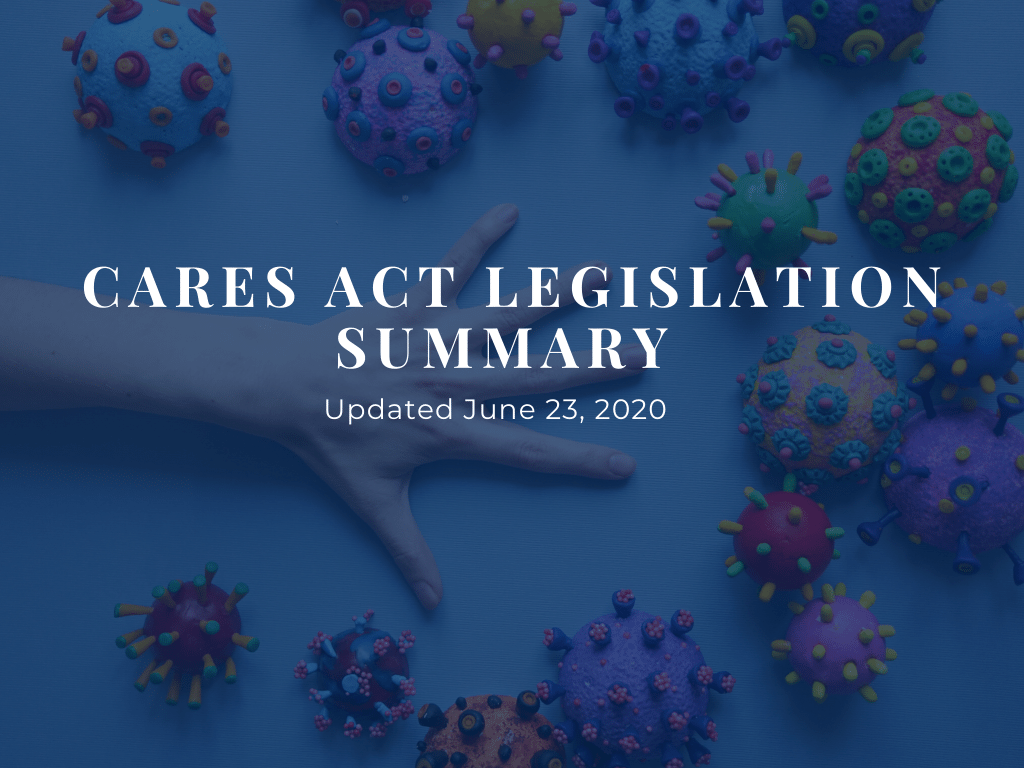
Updated June 23, 2020
[Text in BOLD below are updates reflecting IRS Notices 2020-50 and -51]
On March 27, 2020, the Coronavirus, Aid, Relief, and Economic Security (CARES) Act (the “Act”) was signed into law. A portion of the Act is intended to loosen access to retirement plan funds and provide relief for individuals impacted by the COVID-19 pandemic. The following is a summary of the retirement-related provisions of the Act:
The following is a summary of the retirement-related provisions of the Act:
-
- Coronavirus-related distribution (CRD)
- Waiver of 10% penalty on early withdrawals for amounts up to $100,000 from a retirement plan or IRA taken between January 1, 2020 and December 31, 2020 (so can be retroactively applied to distributions taken prior to enactment of the Act)
- CRDs are only available to a qualified individual (see “qualified individual” below)
- Individuals may elect to pay the tax on a CRD ratably over a three year period (permitted to elect to include entire CRD in income in year of distribution); if elects to include entire CRD in year of distribution and later recontributes any amount the individual must use Form 8915-E and file an amended return; and
- Individuals may elect to repay the CRD back to the plan, tax-free, over the three years from the date of the withdrawal (not limited by plan limits). May be repaid back into the plan allowing the withdrawal, another qualified plan or an IRA that accepts rollovers. CRD will be treated as though repaid in a direct rollover. Repayment does not count towards the single rollover per year limitation. If plan does not allow for rollovers it is not required to accept recontribution. Plan administrator permitted to rely on qualified individual’s certification (see “qualified individual” below) as whether recontribution meets CARES Act rules for CRD unless possesses actual knowledge to the contrary.
- Plan sponsor has discretion whether to offer this design, with modifications (if so desired and their service provider can accommodate), in their qualified plan
- Act does not limit a CRD to active employees (should check with service provider if they will allow CRDs to terminated participants)
- Coronavirus-related distribution (CRD)
Read the entire June 23, 2020 update here.
Carnegie Investment Counsel (“Carnegie”),is a federally registered investment adviser under the Investment Advisers Act of 1940. Registration as an investment adviser does not imply a certain level of skill or training. The oral and written communications of an adviser provide you with information about which you determine to hire or retain an adviser. Neither the information nor any opinion expressed is to be construed as a solicitation to buy or sell a security or the provision of personalized investment, tax or legal advice. For more information please visit https://adviserinfo.sec.gov/.
Carnegie is a member of Retirement Plan Advisory Group™ (RPAG™), a retirement plan consulting firm, which provided the content in this [newsletter]. Neither Carnegie nor RPAG is not in the business of providing legal advice with respect to ERISA or any other applicable law. The materials and information do not constitute, and should not be relied upon as, legal advice. The materials are general in nature and intended for informational purposes only.
Carnegie does not guarantee the accuracy or completeness of the information provided herein. The information is given as of the date indicated and believed to be reliable. Carnegie assumes no obligation to update this information, or to advise on further developments relating to it. This is prepared for informational purposes only. Past performance is no guarantee of future results.
This material was created to provide accurate and reliable information on the subjects covered but should not be regarded as a complete analysis of these subjects. It is not intended to provide specific legal, tax or other professional advice. The services of an appropriate professional should be sought regarding your individual situation.
Source: https://www.napa-net.org/sites/napa-net.org/files/CAREs%20Act%20revised_032220.pdf
[SECURITIES DISCLOSURE] ACR# 352153 6/20
Got Questions? Ready to Meet With a Financial Advisor?
Schedule an appointment today to learn more about how Carnegie can help with financial planning and wealth management.


